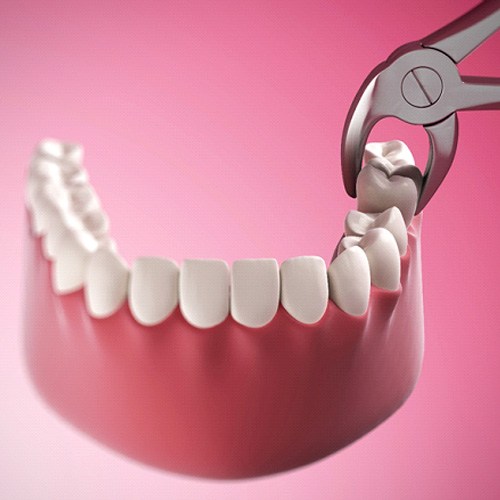

We want you to be able to enjoy your full, natural smile for the rest of your life, but sometimes, this simply isn’t an option. When tooth extractions in Midlothian, TX are necessary, Dr. Nguyen and the rest of our caring team will be here to guide you through it. We’ll also help you consider the pros and cons of dental implants and other forms of tooth replacement. Get in touch with Legacy Dentistry today and let us find the best way to save your smile.


Below are three of the most common reasons why our emergency dentist in Midlothian will recommend a tooth extraction:

The process of removing a tooth depends on several important factors, including the location of the tooth. However, one of the biggest influences on what your treatment will look like depends on if the tooth is above or below your gumline. If it’s above your gumline, then one of our highly experienced and gentle dentists will carefully rock the tooth loose before pulling it out. If it’s underneath the gumline, then they will need to first create a small incision in the gums. Then, they can gently remove the tooth. Since the first step of the entire treatment process in both cases is to thoroughly numb your mouth, you won’t feel anything during your time in the treatment chair.

Before you leave our office, we will provide you with aftercare instructions to help you heal as quickly and comfortably as possible. Here are a few of our recommendations:
If you have further questions about tooth extractions – from what to expect during the treatment to how much it costs – don’t hesitate to get in touch with our Midlothian dental team.

If you’ve been informed that you need a tooth extraction, it’s natural to wonder about the cost. This is a more complex procedure so it can be an investment, and you want to be sure that you can budget for the amount due. Because everyone’s situation is unique, we can’t provide you with an accurate estimate until you have your consultation with one of our dentists. Then, we’ll walk you through the process and anticipated pricing in detail so that you’re fully informed before you move forward with treatment.
Continue reading below to learn more about how the cost is calculated and feel free to contact us for additional information.

How much you owe for your tooth extraction depends on several different factors, such as:

Typically, dental insurance policies contribute to about 50% of the cost of your extractions once your deductible is met. Each plan is different, however, so it’s important to know what’s included in yours. Also, some policies include various restrictions. For example, they might only cover a certain number of teeth or have a waiting period that must be completed before they kick in. You can contact your provider for the details of what they pay, or you can call our friendly staff for assistance. We’re familiar with many policies and are happy to help you maximize your benefits.

If you don’t have insurance and are concerned that you might not be able to afford your extraction, don’t lose hope! We believe that everyone deserves top-quality dental care and don’t want your budget to keep you from the services you need. As a result, we have other ways to help make your procedure more affordable, including:
Often enough, there are options besides a tooth extraction. Dentists even prefer these other choices - they let you keep your natural teeth. Still, whether they’ll work for you depends on your tooth’s underlying issue.
For example, say your tooth suffers from extensive decay. A root canal treatment may help in that case. Through this option, a dentist removes your infected pulp without sacrificing any of your teeth. The root canal process saves your tooth and keeps it in place.
All that said, there’s a good chance the alternatives won’t suit you. Your dentist would likely have suggested them first if they were viable. Once dentists recommend a tooth extraction, that treatment is usually the only choice remaining.
You may think leaving a smile gap alone is okay, even when the extracted tooth is toward the back of the mouth. However, doing so really isn’t a good idea.
You see, an untreated smile gap has adverse effects on your body. A major one is that it makes chewing hard, raising your risk of poor nutrition and indigestion. Another is how the gap may cause issues with talking and lead to a lisp. Worse yet, this space can become a breeding ground for harmful bacteria and cause your other teeth to tilt. You’d then be in danger of further tooth loss and similar issues.
Given these facts, you should see your dentist for a tooth replacement option. Schedule a visit with them once your mouth heals from the extraction.
Several options exist for tooth replacement; which is right for you will depend on how many teeth you have (or had) extracted.
One restoration you could consider is the dental bridge. Using two dental crowns fused to a pontic (i.e., an artificial tooth), this device replaces one to four adjacent teeth after anchoring to nearby pearly whites. That said, it would require the dentist to alter the “abutments” (i.e., the nearby teeth.)
There’s also the option of getting dentures. These appliances can replace multiple teeth throughout your mouth or even an entire arch. In either case, they consist of a gum-colored base and sets of custom-made prosthetic teeth.
Lastly, you could choose dental implants – the best tooth replacement choice. These posts are customized, durable, and long-lasting with proper care. They’re also the only solution that’ll preserve your jawbone.
Of course, your decision will ultimately be up to you and your dentist.
Your preparation for tooth extraction is as crucial as how you handle the aftercare. So, make sure to follow the tips below. They are:
I Need a Dental Checkup & Cleaning I am Looking for a Dentist for My Child I am Worried About Bleeding Gums I am in Pain or Had an Accident Dentists Make Me Anxious/Nervous/Afraid I Have a Cavity or Broken Tooth I am Missing One or More Teeth I Want to Improve My Smile I Want to Straighten My Smile View Our Services